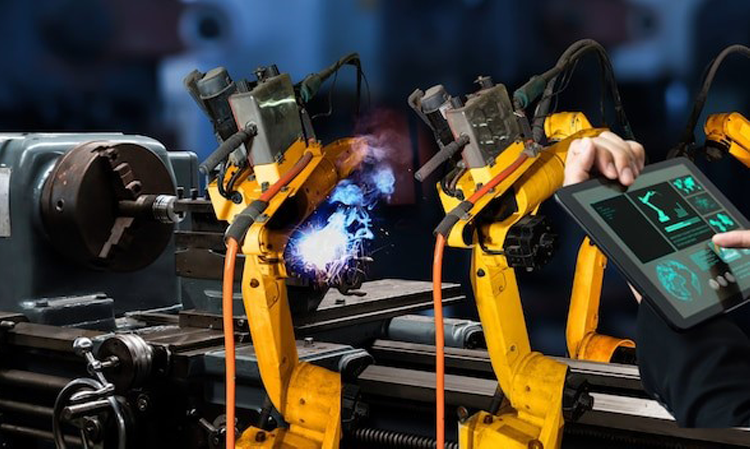The global machining industry is set to undergo significant transformations by 2025, driven by technological advancements, sustainability mandates, and shifting market dynamics. While the trends are global, the strategies and innovations shaping the industry vary across regions. This article takes a closer look at the key trends, with a focus on how leading manufacturing nations like the United States, Germany, Japan, China, and India are approaching the future of machining.
United States: Championing Digitalization and Smart Manufacturing
 The U.S. machining sector is at the forefront of the digital revolution, leveraging smart technologies and data-driven solutions to enhance productivity and competitiveness. With a strong focus on Industry 4.0, the country is integrating digital twins, IoT, and AI into machining processes.
The U.S. machining sector is at the forefront of the digital revolution, leveraging smart technologies and data-driven solutions to enhance productivity and competitiveness. With a strong focus on Industry 4.0, the country is integrating digital twins, IoT, and AI into machining processes.
Key Developments:
- Digital Twins and AI Integration:┬ĀU.S.-based companies such as GE and Lockheed Martin are investing in digital twin technologies to optimize machining operations in aerospace and defense.
- IoT Adoption:┬ĀThe Industrial Internet of Things (IIoT) is widely adopted in American factories, enabling real-time data sharing and predictive maintenance.
- Government Support:┬ĀInitiatives like the National Institute of Standards and TechnologyŌĆÖs (NIST) smart manufacturing programs are fostering innovation and collaboration.
Germany: Leading the Charge in Automation and Precision Engineering

Germany, known for its engineering prowess, is focusing on automation and robotics to maintain its competitive edge. The countryŌĆÖs commitment to precision and efficiency is driving innovations in CNC machining, robotics, and smart factories.
Key Developments:
- Industry 4.0 Leadership:┬ĀGerman companies like Siemens and DMG MORI are setting benchmarks for smart manufacturing by integrating AI and machine learning into machining systems.
- Robotics and Cobots:┬ĀGermany leads in deploying collaborative robots (cobots) for complex machining tasks, enhancing flexibility and safety.
- Sustainability Focus:┬ĀInitiatives like the “Blue Competence” program encourage sustainable machining practices across the German manufacturing sector.
Japan: Pioneering Advanced Materials and Hybrid Machining

Japan, with its reputation for innovation, is focusing on advanced materials and hybrid machining processes. The automotive and electronics sectors are driving the demand for new materials and efficient machining techniques.
Key Developments:
- Hybrid Machining:┬ĀCompanies like Mazak and FANUC are developing hybrid machines that combine subtractive and additive manufacturing, enabling complex part production.
- Material Innovations:┬ĀJapanese manufacturers are exploring nanostructured materials and ceramics for lightweight, high-strength components.
- Precision Machining:┬ĀJapanŌĆÖs expertise in micro-machining is advancing the production of tiny, intricate components for electronics and medical devices.
┬ĀChina: Scaling Automation and Smart Factory Implementation

China, the worldŌĆÖs manufacturing powerhouse, is rapidly scaling up automation and smart factory initiatives. The governmentŌĆÖs ŌĆ£Made in China 2025ŌĆØ strategy emphasizes technological self-reliance and the adoption of advanced manufacturing technologies.
Key Developments:
- AI and Automation:┬ĀChinese companies are deploying AI-driven automation solutions to improve efficiency and reduce reliance on manual labor.
- IoT Integration:┬ĀLeading manufacturers like Huawei are developing IoT platforms tailored to smart factories, enabling seamless connectivity and data exchange.
- Sustainability Initiatives:┬ĀChinaŌĆÖs green manufacturing policies are encouraging eco-friendly machining practices, including energy-efficient equipment and waste reduction.
India: Embracing Digital Transformation and Workforce Development
 IndiaŌĆÖs machining industry is evolving rapidly, driven by a growing emphasis on digitalization and skill development. The governmentŌĆÖs ŌĆ£Make in IndiaŌĆØ initiative aims to boost manufacturing output and attract foreign investment in advanced manufacturing technologies.
IndiaŌĆÖs machining industry is evolving rapidly, driven by a growing emphasis on digitalization and skill development. The governmentŌĆÖs ŌĆ£Make in IndiaŌĆØ initiative aims to boost manufacturing output and attract foreign investment in advanced manufacturing technologies.
Key Developments:
- Digitalization Drive:┬ĀIndian companies are adopting cloud-based platforms and AI tools to enhance machining precision and efficiency.
- Upskilling Programs:┬ĀInitiatives like the Skill India Mission are focused on training workers in digital skills and advanced machining techniques.
- Focus on Sustainability:┬ĀIndian manufacturers are exploring green machining practices, including minimal quantity lubrication (MQL) and energy-efficient machines.
United Kingdom: Innovation in Sustainability and Customization
 The UK is positioning itself as a leader in sustainable machining and mass customization. With a strong emphasis on innovation, British manufacturers are adopting eco-friendly practices and flexible manufacturing systems.
The UK is positioning itself as a leader in sustainable machining and mass customization. With a strong emphasis on innovation, British manufacturers are adopting eco-friendly practices and flexible manufacturing systems.
Key Developments:
- Green Machining:┬ĀUK companies are investing in coolant-free machining and circular economy practices to reduce environmental impact.
- Mass Customization:┬ĀThe demand for personalized products is driving the adoption of flexible manufacturing systems capable of producing customized parts efficiently.
- Government Support:┬ĀPrograms like Innovate UK are funding research and development in advanced manufacturing technologies.
Italy: Excellence in High-Precision Machining and Automation
 ItalyŌĆÖs machining sector is known for its focus on high-precision components and automation. The countryŌĆÖs expertise in sectors like automotive and aerospace is driving demand for advanced CNC machines and robotics.
ItalyŌĆÖs machining sector is known for its focus on high-precision components and automation. The countryŌĆÖs expertise in sectors like automotive and aerospace is driving demand for advanced CNC machines and robotics.
Key Developments:
- Precision Engineering:┬ĀItalian manufacturers are investing in multi-axis CNC machines to produce complex, high-precision components.
- Automation Solutions:┬ĀAutomation is being integrated into traditional machining setups, enhancing productivity and reducing costs.
- Industry Collaboration:┬ĀPartnerships between industry and academia are fostering innovation in machining technologies.
South Korea: Advancing AI and Robotics in Machining

South KoreaŌĆÖs machining industry is leveraging AI and robotics to improve productivity and precision. The countryŌĆÖs focus on technology-driven manufacturing is evident in sectors like electronics and automotive.
Key Developments:
- AI-Driven Machining:┬ĀSouth Korean manufacturers are using AI algorithms to optimize machining processes and improve quality.
- Robotics Integration:┬ĀThe adoption of robotics in machining is enhancing flexibility and reducing cycle times.
- Smart Factories:┬ĀCompanies like Samsung are implementing smart factory solutions to achieve greater operational efficiency.
Brazil: Strengthening Automation and Workforce Development
 BrazilŌĆÖs machining industry is focusing on automation and workforce development to boost competitiveness. The countryŌĆÖs efforts are aimed at modernizing its manufacturing sector and improving productivity.
BrazilŌĆÖs machining industry is focusing on automation and workforce development to boost competitiveness. The countryŌĆÖs efforts are aimed at modernizing its manufacturing sector and improving productivity.
Key Developments:
- Automation Investments:┬ĀBrazilian manufacturers are investing in automated machining systems to reduce costs and improve quality.
- Skill Development:┬ĀTraining programs are being launched to equip workers with the skills needed for advanced machining technologies.
- Sustainability Focus:┬ĀBrazilian companies are adopting eco-friendly practices, including energy-efficient machines and waste reduction initiatives.
Global Outlook: Common Themes Across Countries
While each country is charting its own path, certain common themes emerge across the global machining industry:
- Digitalization and Data-Driven Insights:┬ĀFrom the U.S. to India, digitalization is transforming how machining operations are planned and executed.
- Sustainability and Green Practices:┬ĀEnvironmental considerations are driving innovations in energy-efficient machines and waste reduction.
- Automation and Robotics:┬ĀAutomation is a key focus in countries like Germany, China, and South Korea, where robots are enhancing productivity and precision.
- Workforce Development:┬ĀUpskilling workers to handle advanced technologies is a priority in most regions.
The machining industry in 2025 will be shaped by technological advancements, sustainability mandates, and the need for skilled workers. While countries have different strategies and priorities, the overarching trends of digitalization, automation, and green manufacturing are universal. As manufacturers across the globe adopt these innovations, they will be better positioned to meet the challenges of the future and capitalize on new opportunities. By understanding and leveraging these trends, companies can drive growth, enhance competitiveness, and contribute to a more sustainable and efficient global manufacturing ecosystem.



